Where the Language Meets the Land
Where the Language Meets the Land
In honor of the holiday, here are some Hebrew expressions to share with members of your Bible study group – they’ll love learning them!
At Shavuot/Pentecost our holy days once again occur in tandem, as they did on Passover. And of course, it’s more than just the dates on the calendar. Pentecost tells the sacred story of a unique global convergence of languages in Jerusalem. In the Hebrew Scriptures, Shavuot, the end of the period known as the Counting of the Omer, has come to mark the giving of the Ten Commandments to Moses at Sinai. It’s also is the time we read the story of Ruth, a woman from another religion and culture, no less than another world in those days, who obstinately entwined her fate with ours; Ruth is the great-grandmother of King David and this, too, is part of the bridge of shared tradition that we work to strengthen.
Another tradition of the Shavuot holiday is an intensive night of Bible study. And so, of all directions I could go this time, I hope this blog will be a gift with value if you love the Hebrew word, like I do. You can build entire Bible studies just around these and many others expressions that I’ll save for another time. And as I did in my blog on Hulda’s tomb, I invite you to contact me and share some some of the biblical expressions you’ve come across that we still use; I’d love to publish them here.
As in any language, “lost in translation” can be a problem with Hebrew. Hebrew is regarded by some as a simple language because it’s built on roots, as your Hebrew teacher may have explained. That means that once you know one word you know many. But sometimes roots grow in unexpected directions, don’t they? My favorite example comes from an article I recently edited, where the very erudite academic author wrote that he had arrived at his conclusions by “crucifying the information.” Luckily, my knowledge of Hebrew kicked in, and it took me only the briefest “whaaaa?” moment for me to realize that he actually meant cross-referencing the information! The connection is in the three-letter root tz – l- v which in Hebrew’s economic way, give us crucify, cross reference, crossroad, and many other terms.
But back to Hebrew expressions. Many ancient expressions are still used both in modern Hebrew and in English. Here are some of these and how we use them now: “nothing new under the sun” (Ecc. 1:9) – ho-hum, been there done that; “double-edged sword” (Psalms 149:6; Prov. 5:4, Heb. 4:12) – hey, watch out, that could come back to haunt you; “by the skin of my teeth” (Job 19:20) – whew, that was a close call; and “scapegoat” – pin it on some poor guy and head for the hills (Lev. 16:21–26).
Two expressions, still used in Hebrew but that never crossed the translation divide, come from the land itself. I thought of both of them on the trip I am fortunate enough to drive every week now, through some of the most evocative countryside in Israel – to the Jezreel Valley village of Kfar Yezekiel to visit my new grandbaby, Dan.
China and Sinai
This one doesn’t come from the Bible, but the source is a way to enrich your Bible study; it’s downright cool to be able to drop something into the discourse like “Well, according to the medieval commentator Rashi…”:
The expression is based on verses in the Torah portion we read a few weeks ago: Leviticus 25:1–2. “The Lord spoke to Moses at Mount Sinai: ‘Speak to the Israelites and tell them, ‘When you enter the land that I am giving you, the land must observe a Sabbath to the Lord.’”

The sign reads: “Here we also keep the Sabbath of the Land.” To the east, behind the sign, you can see Mount Gilboa in the background. Photo: Miriam Feinberg Vamosh
As I pass the Megiddo Junction, with Mount Gilboa on my right and the Hill of Moreh straight ahead, I notice a sign put up haphazardly in the field, flanked by grain fields, another symbol of Shavuot, ripening under the spring sun: The sign, surrounded by weeds, says: “This field keeps the Sabbath of rest for the land.” Perhaps surprisingly to some readers, this is not the norm in the Holy Land; hence, the signs that have popped up here and there during this sabbatical year.
The Hebrew word for the “Sabbath of the land” is shmitah. The expression I want to share with you is ma inyan shmita etzl Har Sinai? That means “what does the sabbatical of the land have to do with Mount Sinai?” (It’s catchier in Hebrew, trust me.) The abovementioned Rashi, scholars say, asked the question because he wondered why, when the Bible says all the commandments were given from Sinai, this one was singled out as having been given from Mount Sinai (Lev. 25:1). Was it more important than the others? Or was it to say that it is just as important as all the others, even if it doesn’t seem applicable to everyone at all times in all places in the world?
And so, when Hebrew speakers wonder what in the world one thing, anything, has to do with another, they ask: “What does the sabbatical of the land have to do with Mount Sinai?” (I date myself by recalling a parallel saying: “What does that have to do with the price of tea in China” but actually, since the price of everything in China now has to do with everything in the world I guess we need a different expression anyhow.)
Adding insult to injury, in a really, really bad way
The last leg of my weekly journey to grand-Dan takes me past the fascinating biblical archaeological site of Tel Jezreel. Then comes a winding bit of road that dips right down to the valley floor. On the right is a rather jarring sight – a sort of ski slope, complete with artificial snow and a ski-lift – a creative attempt by local entrepreneurs to get folks to spend more time and money in the valley after they’ve run out of biblical sites to explore, countryside restaurants to enjoy and hikes to take. Right down the road from the ski slope is the likely location of the vineyard that Queen Jezebel goaded her husband Ahab into stealing from its rightful owner, the hapless Naboth (1 Kings 21). Not only did he steal it, the Bible says, but Jezebel had Naboth framed for blasphemy and executed. Well, along came the prophet Elijah with chilling words that to this day Hebrew newspapers and pundits use when they want to say that so-and-so (usually a politician) has done something not only dastardly, but then doubled up on the dastardliness. The expression is: Haratzakhta vegam yarashta, which means: “Have you killed and also taken possession?” “Insult to injury,” the equivalent expression in English, pales in comparison, don’t you agree?

The Jezreel Valley floor, not far from the likely site of Naboth’s vineyard, as seen on a hazy spring day from Tel Jezreel. Photo: Miriam Feinberg Vamosh
Your kids and grandkids will enjoy learning about Hebrew language and expressions in Teach it to Your Children, How Kids Lived in Bible Days.
Read more about Jezebel in Women at the time of the Bible.
Read more about Shavuot/the Feast of Weeks in Food at the time of the Bible: From Adam’s Apple to the Last Supper

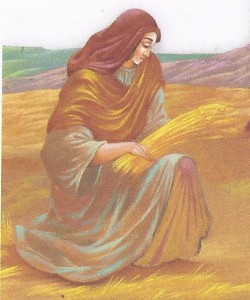
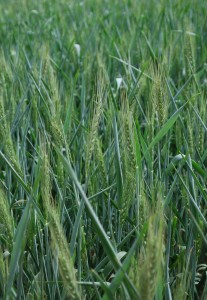

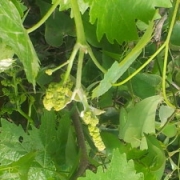



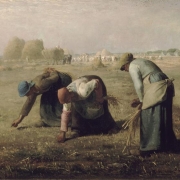
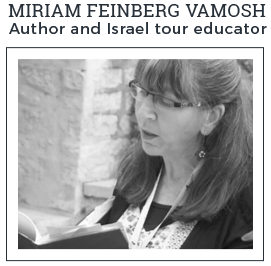
Mariam ! I really enjoyed your blog ! I will have to use some of the wisdom in my Hebrew class to remember my vocabulary. And this reminds me of the time I used the expression “It’s on the fritz” and my mora asked why I was blaming Fritz for the problem !
I love learning where expressions come from and these are terrific. The sabbath land photo is wonderful. Thanks for sharing.